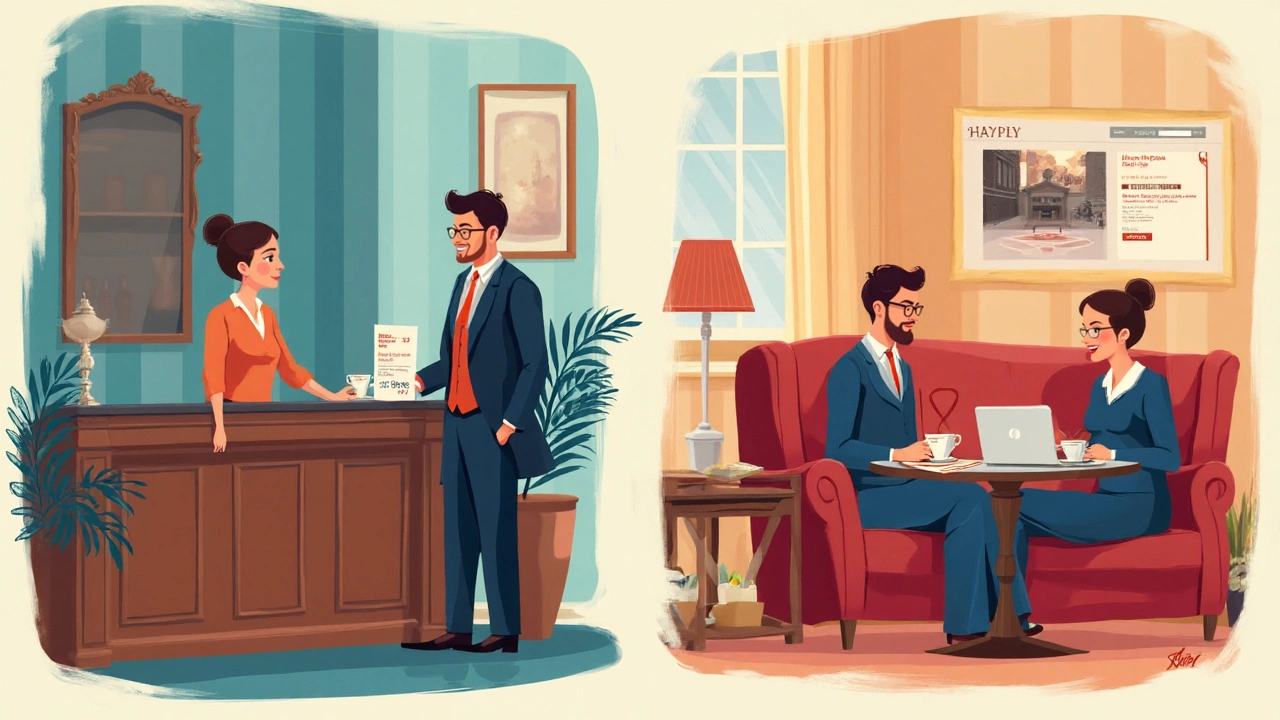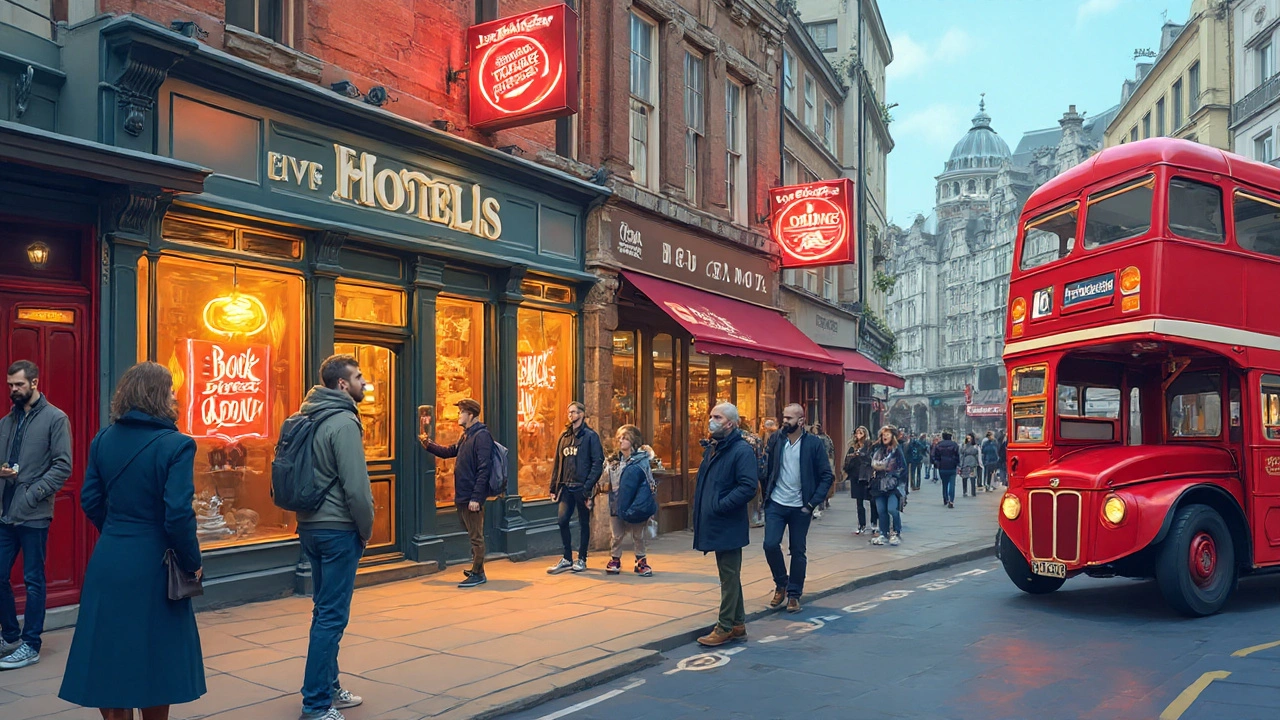How to Find the Cheapest Hotel: Online Booking vs Direct Reservations
 Aug, 4 2025
Aug, 4 2025
Something’s endlessly satisfying about snagging the perfect hotel deal—especially when you know a mate’s paying double for the same room. But here’s the catch: booking platforms shout about exclusive discounts, while hotel websites claim to reward direct loyalty. Who’s actually right? I’ve fallen down this rabbit hole myself, chasing late-night deals for a Wellington city escape or plotting a sneaky Rotorua spa weekend with Alistair. The numbers, the waitlists, the hidden perks–it’s a maze if you don’t know the way through.
The Real Price War: Online vs Direct Hotel Booking
If you’ve compared prices for a single hotel room across different booking sites and the hotel’s own site, it feels like watching three kids argue over who gets the last Tim Tam. Prices bounce around. Sometimes online portals like Booking.com or Expedia undercut the hotel’s site by a cool ten percent. Other times, especially if you book with the hotel itself, you’ll spot secret perks—maybe free breakfast, late checkout, or a cheeky room upgrade slipped in as a thank you.
A study from the University of Houston in 2023 (real one, by the way) looked at the pricing mechanics behind popular hotel chains. The researchers found that about 62% of the time, the price was identical whether you booked online or directly. Bookings made well in advance (“early bird” specials) sometimes favored direct reservations, especially with chains that love their loyalty programs. But here’s a twist: last-minute deals appeared more often on third-party sites, which hounded guests to fill empty rooms to avoid losses.
Negotiation is another overlooked tool. Kiwi hotels, especially outside Auckland’s CBD, often have leeway built into listed prices. If you see a room online but ring the desk, there’s wiggle room. One time, I saved 15% just standing at the Wellington hotel’s front counter, quoting a lower online price out loud. No one loves losing a guest to a faceless website. But remember: big chains stick harder to their price-match policies, while small boutique inns have that personal touch for sweetening the deal.
Hidden Fees, Sweet Perks: What’s Missing from the Price Tag?
The largest trap with online hotel booking platforms? Fees. You’ll spot the “low nightly rate”—until you hit the final payment page, and that pretty number balloons thanks to “service charges,” “resort fees,” or even cheeky “cleaning fees” for longer stays. Compare that side-by-side with booking direct, and suddenly the hotel price looks like the honest one.
Many hotels, especially in New Zealand, guarantee the best rate if you book on their own site. Check their “price match” or “best rate guarantee” policy—places like Sudima or QT Wellington wave this flag. What’s interesting, though, is they may throw in extras you’ll never see on a third-party site. We’re talking free parking (a godsend in Wellington’s CBD), breakfast vouchers, or a bottle of local wine. Most of these perks won’t pop up on Booking.com or Hotels.com—just the base room rate.
Now, if you belong to a loyalty scheme—like Hilton Honors or Accor Live Limitless—the math gets more complicated. Booking direct earns you credit toward free nights, status upgrades, or even late checkout and free breakfast. Third-party bookings usually toss these out the window. If you travel more than twice a year, the rewards stack up fast. And if you’re planning to contact the hotel later for special requests (dietary, wheelchair access, connecting rooms for family), hotels prioritise those who booked direct. It’s human nature.

Comparing Loyalty Programs and Third-Party Deals
Loyalty programs have shaken up the hotel world in the last few years. Big chains want to keep guests in their ecosystem, dangling free nights and exclusive discounts you’ll never find elsewhere. Accor, for example, offers at least 10% off the public rate for members on its own site—and throws in add-ons like spa credits or bar drinks. Hilton has “member rates” only visible if you sign up (free, but they want your email).
But here’s something you might not know unless you’ve been burned: third-party bookings almost never earn you points. Some hotels even refuse to let those guests enjoy loyalty benefits, even if you’re a card-carrying member. Yes, even if you beg. Hilton, IHG, and Marriott hold firm here; you have to book through them or an “official” agent to rack up nights or perks.
Third-party giants like Booking.com, Agoda, and Expedia hit back with their own loyalty tiers. Every few bookings, you’ll get “Genius” or “VIP” badges, sometimes unlocking upgrades or extra discounts. But, the value here doesn’t always stack up to what hotels themselves offer, especially if you often stick to one hotel group over time. Still, if you jump from brand to brand or prefer boutique stays, these online programs might save you a few percent on each booking.
Direct vs. third-party also sways how your booking is handled if anything goes wrong. Book direct, and you’re the hotel’s customer. Book via a website, and suddenly there’s a middleman. If some disaster hits (say, cancelled flights or a sudden illness), hotels are way more flexible on date changes or refunds for direct bookings. More than once, I’ve watched guests at the front desk learn, to their horror, that to amend a reservation, they had to call booking.com’s offshore service line—while I got my dates switched, no questions asked, thanks to a direct reservation.
When Third-Party Booking Wins—and When It Absolutely Doesn’t
Sometimes, third-party sites just win—especially if you want to compare a heap of hotels at once or score a flash, last-minute deal. Booking.com, for instance, scoops up rooms that hotels would otherwise leave empty, slashing prices hard. If you’re flexible (and maybe a bit adventurous), waiting until a day or two before your stay can save up to 40% on unsold inventory. This is most common in big tourist destinations or during quiet seasons.
Meta search tools like Trivago and Kayak throw lots of results at you, helping you find out if a hotel’s own site has an exclusive discount. Google’s hotel search collates nearly everything. But, it’s easy to forget that not every property is listed—some small motels and boutique properties, especially outside cities, opt out. That’s when picking up the phone or checking the hotel’s own website pays off.
Here’s a tip: if you spot a jaw-dropping rate online, screenshot it and call the hotel. 8 out of 10 times in my experience, the person at the desk will match it, and maybe throw in a little something extra for being direct. One time in Queenstown, Alistair and I got a complimentary bottle of pinot. Sometimes, smaller hotels even prefer direct guests—they avoid the 15% commission they’d have to pay on online bookings, so everybody wins.
But be careful with flash sales and non-refundable rates. Hot deals from big online agents can be truly non-flexible, especially if snatched from apps during last-minute blitzes. Direct bookings—especially if you email or call—are often easier to adjust or refund, especially if you’re polite and honest about your trouble. That flexibility is gold if you travel often or have unpredictable plans.

Making the Smartest Choice: A Data-Driven Comparison
Let’s see all this in action with real data. In July 2025, research from New Zealand’s Ministry of Business, Innovation & Employment compared 50 hotels in Auckland, Wellington, and Queenstown across three booking platforms, hotel official sites, and over the counter. Results are in the table below:
| Booking Method | Median Price (NZD) | Hidden Fees? | Perks Offered | Booking Flexibility |
|---|---|---|---|---|
| Online Platform | $245 | Yes (avg. 8%) | Rare | Low (strict terms) |
| Hotel Direct (Website) | $250 | No | Frequent (breakfast, upgrades) | High |
| Hotel Direct (Phone/Walk-in) | $240 | No | Variable (ask for extras) | Highest |
So yes, online rates are often lowest—that’s before you factor in loyalty rewards, extra benefits, or room for negotiation. Once you do, booking directly (especially over the phone or face-to-face) often equals or beats the shiny online price. Plus, you’re more likely to snag those bonus perks—breakfast, wine, or a better view room. If you ever have to change plans, hotels bend over backwards for direct bookers, but online agents rarely budge.
Cheapest hotel bookings usually appear online—if you’re only looking at the sticker price. But in practice, the real “cheapest” deal adds up perks, loyalty points, flexibility, and how easy it is to get what you want if things go sideways. Think about what actually matters to you: the upfront dollars, or overall value and peace of mind. And never be afraid to pick up the phone and ask if there’s a better rate—sometimes, the best deals still come from a real human on the other end.